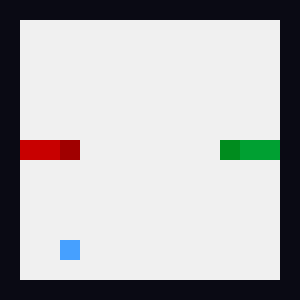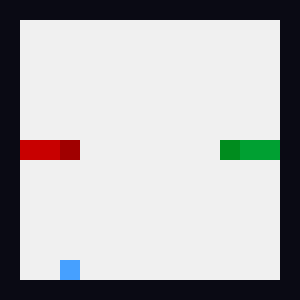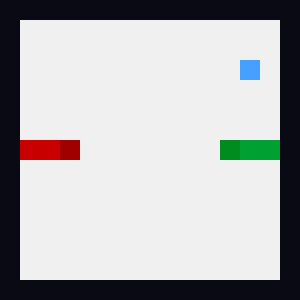Zen - C ++
Este Codémon no está aquí para comer sino para luchar. Él sabe que un enemigo muerto no robará sus manzanas.
Name| Author |Launch with
Zen GholGoth21 Zen.exe
Estrategia
Todos (excepto CircleOfLife) corren hacia las manzanas, pero no Zen, no siempre. Si el enemigo puede alcanzar la comida antes que él, simplemente espera en el centro (¿qué? ¿Pero qué haces aquí, CircleOfLife?). De lo contrario, Zen va a la manzana y se da vuelta mientras espera que algo suceda. De hecho, usa la manzana como cebo.
No codifiqué nada en contra de la curiosa estrategia de CircleOfLife porque solo puede ganar con mucha suerte.
El código
Este es el código completo del proyecto C ++. Cortar los 11 archivos de origen y el Makefile y compilar conmake
$ cat src/* Makefile
/*
* @file Enemy.cpp
* @author GholGoth21
* @date Créé le 1 mars 2015 à 14:10
*/
#include "Enemy.h"
#include <fstream>
Enemy::Enemy()
{
}
Enemy::~Enemy()
{
}
std::ostream &operator<<(std::ostream &os, const Enemy& e)
{
return os<<e.m_pos<<" "<<e.m_date;
}
std::istream &operator>>(std::istream &is, Enemy& e)
{
return is>>e.m_pos>>e.m_date;
}
int Enemy::distTo(int2 const &target, int date) const
{
return m_pos.distTo(target)-(date-m_date);
}
bool Enemy::recentActivity(int2 const &pos, int date, int maxDelay) const
{
return pos.distTo(m_pos)<=date-m_date && date-m_date<=maxDelay;
}
/*
* @file Enemy.h
* @author GholGoth21
* @date Créé le 1 mars 2015 à 14:10
*/
#ifndef ENEMY_H
#define ENEMY_H
#include "int2.h"
class Enemy
{
public:
Enemy();
virtual ~Enemy();
public:
void setPos(int2 const &pos, int date) { m_pos=pos; m_date=date; }
int distTo(int2 const &target, int date) const;
int2 const &pos() const { return m_pos; }
bool recentActivity(int2 const &pos, int date, int maxDelay) const;
friend std::ostream &operator<<(std::ostream &os, const Enemy& e);
friend std::istream &operator>>(std::istream &is, Enemy& e);
private:
int2 m_pos;
int m_date;
};
#endif /* ENEMY_H */
/*
* @file Snake.cpp
* @author GholGoth21
* @date Créé le 28 février 2015 à 17:47
*/
#include "Snake.h"
#include "enums.h"
#include "StrManip.h"
#include "Enemy.h"
#include <vector>
#include <cmath>
Snake::Snake(std::string const &body)
{
std::vector<std::string> posList;
split(body, '/', posList);
for(auto &pos : posList)
m_body.push_back(int2(pos));
}
Snake::~Snake()
{
}
Command Snake::move(int2 food, int date, Enemy const &enemy)
{
Command bestCommand[Command::count];
int myDist=curPos().distTo(food);
int enemyDist=enemy.distTo(food,date);
if(myDist>=enemyDist && enemyDist>2)
{
orderCommand(int2(MAPSIZE/2,MAPSIZE/2), bestCommand);
for(int i=0; i<Command::count; i++)
if(validCommand(bestCommand[i]) && !enemy.recentActivity(nextPos(bestCommand[i]),date,5))
return bestCommand[i];
}
if((myDist==1 && enemyDist>((len()-1)/2)*2+3) || enemyDist<-5)
{
orderCommand(food, bestCommand);
for(int i=0; i<Command::count; i++)
if(validCommand(bestCommand[i]))
return bestCommand[i];
}
int2 embushPoint;
int minDist=-1;
foreach_enum(Direction, d)
{
int2 point(food+d.vector());
int dist=point.quadDistTo(enemy.pos());
if(dist<minDist || minDist<0)
{
minDist=dist;
embushPoint=point;
}
}
if(curPos().distTo(embushPoint)<enemy.distTo(embushPoint,date)-((len()-1)/2)*2)
{
int minimalAction=-1;
int qMinDist = curPos().quadDistTo(embushPoint);
Command minimalCommand;
foreach_enum(Command, c)
{
int2 np=nextPos(c);
int qDist = np.quadDistTo(embushPoint);
if((qDist<minimalAction || minimalAction<0) && qDist>qMinDist && validCommand(c))
{
minimalAction=qDist;
minimalCommand=c;
}
}
return minimalCommand;
}
else
{
orderCommand(embushPoint, food, bestCommand);
for(int i=0; i<Command::count; i++)
if(validCommand(bestCommand[i]) && nextPos(bestCommand[i])!=food)
return bestCommand[i];
}
return Command::forward;
}
bool Snake::validCommand(Command c) const
{
if(!c.isValid())
return false;
int2 np = nextPos(c);
if(!(0<np.x && np.x<MAPSIZE-1 && 0<np.y && np.y<MAPSIZE-1))
return false;
for(unsigned int i=2; i<m_body.size()-1; i++)
if(np==m_body.at(i))
return false;
return true;
}
bool Snake::isStarting() const
{
if(m_body.size()==3)
{
if(m_body.at(0)==int2(3,(MAPSIZE)/2) && m_body.at(1)==int2(2,(MAPSIZE)/2) && m_body.at(2)==int2(1,(MAPSIZE)/2))
return true;
else if(m_body.at(0)==int2(MAPSIZE-4,(MAPSIZE)/2) && m_body.at(1)==int2(MAPSIZE-3,(MAPSIZE)/2) && m_body.at(2)==int2(MAPSIZE-2,(MAPSIZE)/2))
return true;
}
return false;
}
void Snake::orderCommand(int2 target, Command *tab)
{
int weight[Command::count];
foreach_enum(Command, c)
{
int2 np = nextPos(c);
weight[c]=np.quadDistTo(target);
tab[c]=c;
}
for(int i=0; i<Command::count-1; i++)
{
while(i>=0 && weight[tab[i]]>weight[tab[i+1]])
{
varSwitch(tab[i], tab[i+1]);
i--;
}
}
}
void Snake::orderCommand(int2 target1, int2 target2, Command *tab)
{
int weight[Command::count];
foreach_enum(Command, c)
{
int2 np = nextPos(c);
weight[c]=np.quadDistTo(target1)+np.quadDistTo(target2);
tab[c]=c;
}
for(int i=0; i<Command::count-1; i++)
{
while(i>=0 && weight[tab[i]]>weight[tab[i+1]])
{
varSwitch(tab[i], tab[i+1]);
i--;
}
}
}
/*
* @file Snake.h
* @author GholGoth21
* @date Créé le 28 février 2015 à 17:47
*/
#ifndef SNAKE_H
#define SNAKE_H
#include "int2.h"
#include <vector>
#define MAPSIZE 15
class Enemy;
class Snake
{
public:
Snake(std::string const &body);
virtual ~Snake();
public:
Command move(int2 food, int date, Enemy const &enemy);
Direction curDir() const { return (m_body.at(0)-m_body.at(1)).direction(); }
int2 curPos() const { return m_body.at(0); }
int2 nextPos(Command c) const { return curPos()+curDir().applyCommand(c).vector(); }
bool validCommand(Command c) const;
bool isStarting() const;
void orderCommand(int2 target, Command *tab);
void orderCommand(int2 target1, int2 target2, Command *tab);
int len() const { return m_body.size(); }
private:
std::vector<int2> m_body;
};
#endif /* SNAKE_H */
/*
* @file StrManip.cpp
* @author GholGoth21
* @date Créé le 7 février 2015 à 17:26
*/
#include "StrManip.h"
#include <sstream>
std::vector<std::string> &split(const std::string &s, char delim, std::vector<std::string> &elems)
{
std::stringstream ss(s);
std::string item;
while(std::getline(ss, item, delim))
elems.push_back(item);
return elems;
}
int atoi(std::string const &text)
{
std::stringstream ss(text);
int val;
ss >> val;
return val;
}
/*
* @file StrManip.h
* @author GholGoth21
* @date Créé le 7 février 2015 à 17:26
*/
#ifndef STRMANIP_H
#define STRMANIP_H
#include <string>
#include <vector>
std::vector<std::string> &split(const std::string &s, char delim, std::vector<std::string> &elems);
int atoi(std::string const &text);
#endif /* STRMANIP_H */
/*
* @file enums.cpp
* @author GholGoth21
* @date Créé le 28 février 2015 à 17:55
*/
#include "enums.h"
#include "int2.h"
Command Direction::turnTo(Direction newDir) const
{
if(!isValid() || !newDir.isValid())
return Command::count; //Invalid
else if((m_value==Direction::up && newDir==Direction::left) || (m_value==Direction::left && newDir==Direction::down) ||
(m_value==Direction::down && newDir==Direction::right) || (m_value==Direction::right && newDir==Direction::up))
return Command::left;
else if((m_value==Direction::up && newDir==Direction::right) || (m_value==Direction::right && newDir==Direction::down) ||
(m_value==Direction::down && newDir==Direction::left) || (m_value==Direction::left && newDir==Direction::up))
return Command::right;
else if(m_value==newDir)
return Command::forward;
else
return Command::count; // Invalid
}
Direction Direction::applyCommand(Command c) const
{
if(c==Command::forward)
return m_value;
else if(c==Command::left)
{
switch(m_value)
{
case Direction::left:
return Direction::down;
case Direction::up:
return Direction::left;
case Direction::right:
return Direction::up;
case Direction::down:
return Direction::right;
default:
break;
}
}
else if(c==Command::right)
{
switch(m_value)
{
case Direction::left:
return Direction::up;
case Direction::up:
return Direction::right;
case Direction::right:
return Direction::down;
case Direction::down:
return Direction::left;
default:
break;
}
}
return Direction::count; // Invalid
}
int2 Direction::vector() const
{
switch(m_value)
{
case Direction::left:
return int2(-1,0);
case Direction::up:
return int2(0,-1);
case Direction::right:
return int2(1,0);
case Direction::down:
return int2(0,1);
default:
return int2(0,0);
}
}
std::ostream &operator<<(std::ostream &os, const Command& c)
{
switch(c.m_value)
{
case Command::left:
return os<<"L";
case Command::right:
return os<<"R";
default:
return os<<"F";
}
}
/*
* @file enums.h
* @author GholGoth21
* @date Créé le 28 février 2015 à 17:55
*/
#ifndef ENUMS_H
#define ENUMS_H
#include <ostream>
struct int2;
#define DECL_ENUM_STRUCT(_name) \
_name() : m_value(static_cast<Type>(0)) {} \
_name(Type value) : m_value(value) {} \
_name(int value) : m_value(static_cast<Type>(value)) {} \
static Type begin() { return static_cast<Type>(0); } \
static Type end() { return count; } \
_name &operator++() { m_value=static_cast<Type>(static_cast<int>(m_value)+1); return *this; } \
operator int() const { return static_cast<Type>(m_value); } \
Type m_value;
#define foreach_enum(_type,_var) for(_type _var = _type::begin(); _var<_type::end(); ++_var)
struct Command
{
enum Type
{
left,
forward,
right,
count
};
bool isValid() const { return m_value<count; }
friend std::ostream &operator<<(std::ostream &os, const Command& c);
DECL_ENUM_STRUCT(Command)
};
struct Direction
{
enum Type
{
left,
up,
right,
down,
count
};
bool isValid() const { return m_value<count; }
Command turnTo(Direction newDir) const;
Direction applyCommand(Command c) const;
int2 vector() const;
DECL_ENUM_STRUCT(Direction)
};
#endif /* ENUMS_H */
/*
* @file int2.cpp
* @author GholGoth21
* @date Créé le 28 février 2015 à 17:37
*/
#include "int2.h"
#include "enums.h"
#include "StrManip.h"
#include <vector>
#include <cmath>
int2::int2()
{
}
int2::~int2()
{
}
int2::int2(std::string const &text)
{
std::vector<std::string> posList;
split(text, ',', posList);
x=atoi(posList.at(0));
y=atoi(posList.at(1));
}
Direction int2::direction() const
{
if(x==0 && y==0)
return Direction::count; // Invalid
else if(y>=std::abs(x))
return Direction::down;
else if(x>=std::abs(y))
return Direction::right;
else if(x<=-std::abs(y))
return Direction::left;
else
return Direction::up;
}
Direction int2::secondary() const
{
if(x==0 || y==0)
return Direction::count; //Invalid
else if(y<=std::abs(x) && y>=0)
return Direction::down;
else if(x<=std::abs(y) && x>=0)
return Direction::right;
else if(x>=-std::abs(y) && x<=0)
return Direction::left;
else
return Direction::up;
}
int int2::distTo(int2 const &other) const
{
return std::abs(x-other.x)+std::abs(y-other.y);
}
int int2::quadDistTo(int2 const &other) const
{
return sq(x-other.x)+sq(y-other.y);
}
int2 int2::operator+(int2 const &other) const
{
return int2(x+other.x,y+other.y);
}
int2 int2::operator-(int2 const &other) const
{
return int2(x-other.x,y-other.y);
}
std::ostream &operator<<(std::ostream &os, const int2& c)
{
return os<<c.x<<","<<c.y;
}
std::istream &operator>>(std::istream &is, int2& c)
{
std::string text;
is>>text;
c=int2(text);
return is;
}
/*
* @file int2.h
* @author GholGoth21
* @date Créé le 28 février 2015 à 17:37
*/
#ifndef INT2_H
#define INT2_H
#include "enums.h"
#include <string>
struct int2
{
public:
int2();
int2(int p_x, int p_y) : x(p_x), y(p_y) {}
int2(std::string const &text);
virtual ~int2();
public:
Direction direction() const;
Direction secondary() const;
int distTo(int2 const &other) const;
int quadDistTo(int2 const &other) const;
int2 operator+(int2 const &other) const;
int2 operator-(int2 const &other) const;
bool operator==(int2 const &other) const { return x==other.x && y==other.y; }
bool operator!=(int2 const &other) const { return x!=other.x || y!=other.y; }
friend std::ostream &operator<<(std::ostream &os, const int2& c);
friend std::istream &operator>>(std::istream &is, int2& c);
public:
int x;
int y;
};
inline int sq(int val) { return val*val; }
template<typename T>
inline void varSwitch(T &a, T &b) { T tmp=a; a=b; b=tmp; }
#endif /* INT2_H */
/*
* @file main.cpp
* @author GholGoth21
* @date Créé le 28 février 2015 à 17:23
*/
#include "int2.h"
#include "Snake.h"
#include "Enemy.h"
#include <cstdlib>
#include <iostream>
#include <fstream>
using namespace std;
/*
* @brief La fonction principale du programme.
* @param argc Le nombre de paramètres passés en ligne de commandes.
* @param argv La liste des paramètres passés en ligne de commandes.
*/
int main(int argc, char** argv)
{
/* Error handling */
if(argc<3)
{
cerr<<"Error : not enough arguments on the command line."<<endl;
cout<<"F"<<endl;
return 1;
}
/* Init and load */
int2 prevFood;
int date = 0;
Enemy enemy;
ifstream load("PreviousState.txt");
if(load)
{
load>>date;
load>>prevFood;
load>>enemy;
load.close();
}
int2 food(argv[1]);
Snake me(argv[2]);
if(me.isStarting())
{
date=0;
if(me.curPos().x<MAPSIZE/2)
enemy.setPos(int2(MAPSIZE-4,MAPSIZE/2), 0);
else
enemy.setPos(int2(3,MAPSIZE/2), 0);
}
else if(prevFood!=food && me.curPos()!=prevFood)
{
enemy.setPos(prevFood, date);
}
/* Moving */
cout<<me.move(food,date,enemy)<<endl;
/* Saving */
ofstream save("PreviousState.txt");
if(save)
{
save<<++date<<endl;
save<<food<<endl;
save<<enemy<<endl;
save.close();
}
return 0;
}
# Makefile
HEADERS = $(wildcard $(SRCPATH)/*.h)
SOURCES = $(wildcard $(SRCPATH)/*.cpp)
OBJECTS = $(patsubst $(SRCPATH)/%.cpp,$(BUILDPATH)/%.o,$(SOURCES))
M = Makefile
CFLAGS = -Wall -std=c++11
BINPATH = bin
BUILDPATH = build
SRCPATH = src
ifeq ($(OS),Windows_NT)
EXE = Zen.exe
else
EXE = Zen
endif
$(BINPATH)/$(EXE): $(BINPATH) $(BUILDPATH) $(OBJECTS)
g++ -o $@ $(OBJECTS)
$(BUILDPATH)/%.o: $(SRCPATH)/%.cpp $(HEADERS) $M
g++ $(CFLAGS) -o $@ -c $<
$(BINPATH) $(BUILDPATH):
mkdir $@
clean:
rm $(OBJECTS)
O descargue el archivo zip: Zen.zip
Resultados
| Name | Master | Score |
|--------------|------------|-------|
| Zen | GholGoth21 | 24 |
| SneakySnake | Cipher | 10 |
| ViciousViper | Cipher | 6 |
| CircleOfLife | Manu | 4 |
Y algunas batallas típicas (ViciousViper vs Zen y SneakySnake vs Zen):
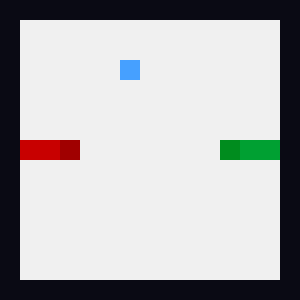
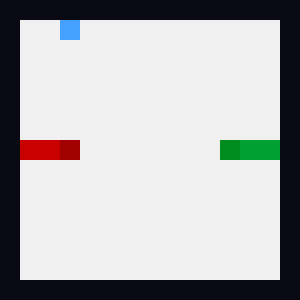
Editar : agrego esta batalla muy interesante contra CircleOfLife:
